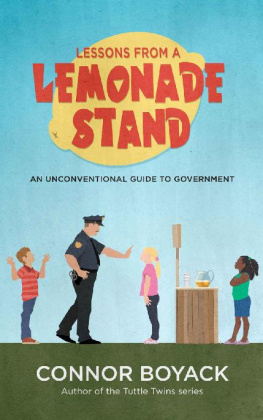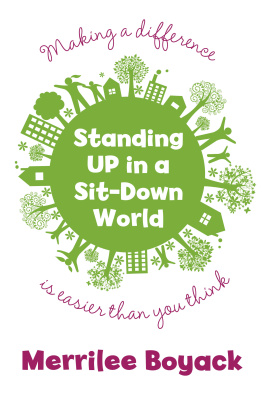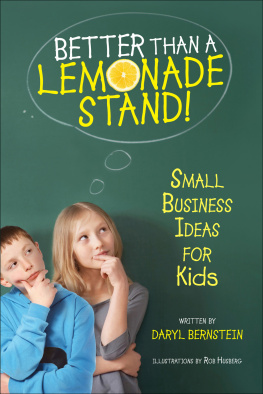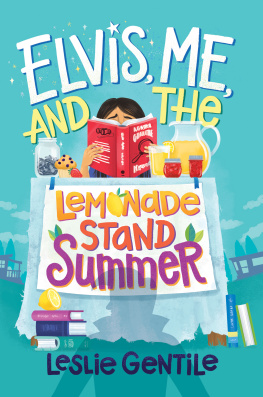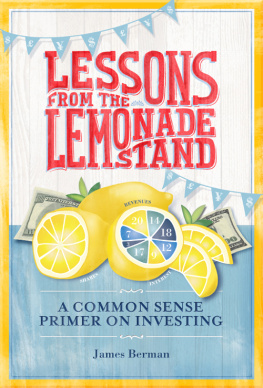ADDITIONAL PRAISE FOR
LESSONS FROM A LEMONADE STAND
Lessons from a Lemonade Stand is the book I wish had been available to me when my children were teenagers and were asking me about government, law, and freedom. In a clear and understandable way it explains why the state is a problem for those of us who value freedom, what real law is, as opposed to the fickle and often irrational dictates of so-called lawmakers, and why our consent to government may not be all that it appears to be on the surface. If you want to know why kids who sell lemonade outside their homes are dangerous law-breakers who must be forcibly restrained lest they cause you irreparable harm, read this book !
Gerard Casey , professor emeritus of philosophy at University College Dublin and author, Libertarian Anarchy
Ever have that gut reaction against a stupid law or bumbling bureaucracythe incensed feeling that its just plain wrong? Boyack has your back. He reveals that not only is your gut correct, but that there are principled, logical reasons why. Lessons from a Lemonade Stand provides crucial distinctions between whats legal and whats right, states and governments, and obedience versus justice. It also provides a compelling alternative.
Isaac Morehouse , founder of Praxis and author, Freedom Without Permission
An unconventional guide to government
CONNOR BOYACK
LIBERTAS PRESS
SALT LAKE CITY, UT
Copyright 2017 by Connor Boyack.
All rights reserved. No part of this publication may be reproduced, distributed or transmitted in any form or by any means, including photocopying, recording, or other electronic or mechanical methods, without the prior written permission of the publisher.
Libertas Press
785 East 200 South, Suite 2
Lehi, UT 84043
Lessons from a Lemonade Stand: An Unconventional Guide to Government 1st ed.
ISBN-13 978-1-943521-18-0 (paperback)
First Edition: December 2017
For bulk orders, send inquires to info@libertasutah.org.
To Aaron Russo
for being my Morpheus
Other titles by the author:
Passion-Driven Education: How to Use Your Childs Interests to Ignite a Lifelong Love of Learning
Feardom: How Politicians Exploit Your Emotions
and What You Can Do to Stop Them
The Tuttle Twins childrens book series
Anxiously Engaged: Essays on Faith,
Family, & Freedom
Latter-day Responsibility: Choosing Liberty
through Personal Accountability
Latter-day Liberty: A Gospel Approach to
Government and Politics
None are more hopelessly enslaved than
those who falsely believe they are free.
JOHANN WOLFGANG VON GOETHE
INTRODUCTION
N
If your neighborhood is anything like mine, you often see lemonade stands setting up shop during the warm summer season. Theyre a great way for children to learn how to run a business and make a sale. And even when siblings drink half of the product or the weather turns cool and cloudy, children are enthralled by the idea of making money in such a fun, refreshing way.
As it turns out, these lemonade stands are often criminal enterprises.
Take the case of Abigail Krutsinger, a four-year-old who decided, with her parents help, to offer some refreshing drinks to bikers and tourists passing through her small city in Iowa for the annual bicycle ride across the state. After half an hour of selling lemonade at 25 cents per cup, she had made $5not bad for a girl her age. Then the police arrived and shut her down.
Abigails crime? She didnt obtain a permita government permission slip. Even if she and her family had wanted to obtain this permission, the city was demanding a staggering $400just to sell some lemonade! Disappointed that his daughter was denied an opportunity to gain experience running a (very) small business, Abigails father said, If the line is drawn to the point where a 4-year-old cant sell a couple glasses of lemonade for 25 cents, then I think the line has been drawn at the wrong spot.
Abigail is not an anomaly. A few teenage girls in Midway, Georgia, built enough of an operation that they named themselves the Midway Lemonade Girls and got some corporate sponsors. These girls were trying to earn enough money to visit a nearby water park, but their efforts were thwarted by the citys police chief who, after ending these girls experience in entrepreneurship, told reporters he didnt know how the lemonade was made, who made it or what was in it. To obey the law in their city, the girls would have had to pay the city $50 each day for a business and health permit, even if they were operating on their driveway. Its kind of crazy that we couldnt sell lemonade, said 14-year-old Kasity Dixon, one of the Midway Lemonade Girls. It was fun, but we had to listen to the cops and shut it down. The police chief, interviewed by a local news station, recalled what his law enforcement officers had told the girls:
We had told them, We understand you guys are young, but still, youre breaking the law, and we cant let you do it anymore. The law is the law, and we have to be consistent with how we enforce the laws.
Then theres the case of the Marriott and Augustine kids, whose families joined forces to sell lemonade to the hordes of people flocking to town for the U.S. Open golf championship. The children, who were raising money to help kids with cancer, were shut down for not having a permit. Even worse, the families were fined a staggering $500! The message to kids, one of the moms said, is that theres no American dream.
These stories represent just a fraction of the many cases where aspiring young business owners faced a harsh reality of regulations, permits, and prohibitions. All they wanted to do was sell a drink to a consenting customer. Why all the bureaucracy?
Most parents, if their children experienced a similar encounter with the government, would tell their children to obey the law. Jump through the legal hoops required, and if they cantor wontthen shut the business down. This is the conventional wisdomthe path of least resistance.
But what if its wrong?
What if there is no valid reason why a child should have to seek a permission slip before selling lemonade? What if that child has the right to do so?
What if a child really needed to earn some money and decided to break the law and sell lemonade anyway?
What if adults should be able to do the same?
The answers to these questions apply to much more than mere lemonade. These questions, and many more like them, form the foundation of this booka review of whats right, whats wrong, and in which cases you are justified in saying no when the government tells you to do something you think you shouldnt have to do.
Shall we begin?
NOTES
- Mark Carlson, Coralville Police Shut Down Lemonade Stands During RAGBRAI, Cedar Rapids (IA) Gazette , August 2, 2011, http://www.thegazette.com/2011/08/02/coralville-police-shut-down-lemonade-stands-during-ragbrai.
- 3 Girls Busted for Illegal Lemonade Stand, NBC News, July 15, 2011, http://www.nbcnews.com/id/43769978/ns/us_news-weird_news/t/girls-busted-illegal-lemonade-stand/.
- Harry Bradford, Childrens Families Fined $500 for Operating Illegal Lemonade Stand, Huffington Post, June 17, 2011, http://www.huffingtonpost.com/2011/06/17/us-open-lemonade-fine-neighbors-parking_n_878949.html. Following a backlash in the media, the fine was waved and the children were allowed to re-open their stand elsewhere.
No society can exist unless the laws are respected to a certain degree. The safest way to make laws respected is to make them respectable. When law and morality contradict each other, the citizen has the cruel alternative of either losing his moral sense or losing his respect for the law. These two evils are of equal consequence, and it would be difficult for a person to choose between them.

